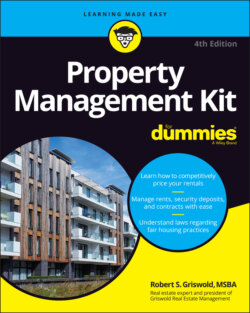Читать книгу Property Management Kit For Dummies - Robert S. Griswold - Страница 44
Delegating management activities
ОглавлениеAs a landlord, you may look at all the tasks you have to do and get a bit overwhelmed. But dealing with some responsibilities yourself and delegating some to other people can make your job much easier. To manage your property to the best of your ability, look at your personal skill set to determine which tasks you can do and which ones you need to delegate.
Throughout this book, I tell you various ways that you can delegate certain management activities and responsibilities to a personal team of experts, composed of the following:
A property manager: Ultimately, you can delegate all the management activities to a professional property manager. Having a property manager doesn’t mean you’re totally off the hook, however. Depending on your arrangement with your property manager, you may still find yourself providing the oversight and approvals that allow you to materially participate at an ownership level — an arrangement that has income tax advantages and also gives you the peace of mind of knowing that your rental property is well managed. (See Chapter 3 for more on using a property manager.)
A maintenance professional: The skills required to manage your own rental properties are different from the skills you need to handle your own property maintenance. Most rental property owners find that using trusted and reasonably priced vendors, suppliers, and contractors is the best alternative. You may not have the requisite skills, equipment, or time to do the work properly and quickly, and you certainly will have to acquire the right parts and supplies. Although doing the work yourself may seem to be cost-effective, you’ll quickly lose any savings if the rental unit sits vacant for additional time. (See Chapter 17 for help on finding the right maintenance personnel.) A client once hired me to manage a 100-unit rental property with nearly 30 vacant units. The rental market was pretty good, and we knew that we could rent the units after they’d been painted and cleaned, and after all minor maintenance items were addressed. The owner had always managed the property personally and used only in-house maintenance personnel for all work, including painting. The owner wanted to have the in-house maintenance person paint two units per week, but it would take nearly four months for all the units to be rent-ready. I was able to demonstrate that hiring an outside contractor to paint and having the in-house maintenance folks focus on only minor maintenance and cleaning would get all 30 units rent-ready in less than a month. Even though the painting contractor was an expense the owner didn’t want to incur, hiring the contractor was the better way to go, because we were able to rent the units quickly and more than cover the additional costs. Sometimes, the cheapest way isn’t the best way to solve a problem.
An accountant: Many owners don’t have the patience or discipline to keep the accurate accounting records that are so important at tax time, so they prefer to have a bookkeeper take care of the record-keeping and help them manage their bills. See Chapter 21 for more information on accounting.
A legal expert: Some landlords may look forward to their day in court, but most find the experience to be unrewarding and problematic. Using a local attorney who specializes in landlord–tenant legal matters is an excellent idea when you have legal issues that may end up in court. A really good attorney will help you stay out of court, which should always be your goal.
A prescreened applicant source: Some owners use an online rental housing marketing source, a local rental locator service, or certain real estate brokers in your area who seem to have a steady stream of potential renters to provide prescreened rental applicants. Your level of delegation on this matter may very well depend on whether you own one or ten rental units.
